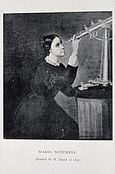Portal:Science: Difference between revisions
Added "subpages=keep" to the portal maintenance status template atop |
m oops |
||
| (One intermediate revision by the same user not shown) | |||
| Line 15: | Line 15: | ||
<div class="portal-column-left-wide"> <!-- Switch to one column on narrow screens --> |
<div class="portal-column-left-wide"> <!-- Switch to one column on narrow screens --> |
||
{{ |
{{/box-header|''Selected article''||}} |
||
{{Transclude list item excerpts as random slideshow | paragraphs=1-2 | files=1 | limit=15 | more= |
|||
| Portal talk:Science |
|||
| section = Recognized content |
|||
}}<!-- might be better to switch to |section=Featured articles --> |
|||
{{Box-footer}} |
|||
{{Random portal component|max=20|header=''Selected image''|subpage=Featured picture|seed=83}} |
{{Random portal component|max=20|header=''Selected image''|subpage=Featured picture|seed=83}} |
||
Revision as of 23:52, 7 June 2020
| Main page | Main topics & Categories | Related portals & WikiProjects | Things you can do |
Science portal
Science is a strict systematic discipline that builds and organizes knowledge in the form of testable hypotheses and predictions about the world. Modern science is typically divided into three major branches: the natural sciences (e.g., physics, chemistry, and biology), which study the physical world; the social sciences (e.g., economics, psychology, and sociology), which study individuals and societies; and the formal sciences (e.g., logic, mathematics, and theoretical computer science), which study formal systems, governed by axioms and rules. There is disagreement whether the formal sciences are scientific disciplines, as they do not rely on empirical evidence. Applied sciences are disciplines that use scientific knowledge for practical purposes, such as in engineering and medicine.
The history of science spans the majority of the historical record, with the earliest written records of identifiable predecessors to modern science dating to Bronze Age Egypt and Mesopotamia from around 3000 to 1200 BCE. Their contributions to mathematics, astronomy, and medicine entered and shaped the Greek natural philosophy of classical antiquity, whereby formal attempts were made to provide explanations of events in the physical world based on natural causes, while further advancements, including the introduction of the Hindu–Arabic numeral system, were made during the Golden Age of India. Scientific research deteriorated in these regions after the fall of the Western Roman Empire during the Early Middle Ages (400 to 1000 CE), but in the Medieval renaissances (Carolingian Renaissance, Ottonian Renaissance and the Renaissance of the 12th century) scholarship flourished again. Some Greek manuscripts lost in Western Europe were preserved and expanded upon in the Middle East during the Islamic Golden Age, along with the later efforts of Byzantine Greek scholars who brought Greek manuscripts from the dying Byzantine Empire to Western Europe at the start of the Renaissance.
The recovery and assimilation of Greek works and Islamic inquiries into Western Europe from the 10th to 13th century revived "natural philosophy", which was later transformed by the Scientific Revolution that began in the 16th century as new ideas and discoveries departed from previous Greek conceptions and traditions. The scientific method soon played a greater role in knowledge creation and it was not until the 19th century that many of the institutional and professional features of science began to take shape, along with the changing of "natural philosophy" to "natural science".
New knowledge in science is advanced by research from scientists who are motivated by curiosity about the world and a desire to solve problems. Contemporary scientific research is highly collaborative and is usually done by teams in academic and research institutions, government agencies, and companies. The practical impact of their work has led to the emergence of science policies that seek to influence the scientific enterprise by prioritizing the ethical and moral development of commercial products, armaments, health care, public infrastructure, and environmental protection. (Full article...)
Selected article
Lua error: No page specified.
Selected image
Selected biography
Her parents were Quakers who, unconventionally for their time, insisted on giving her the same quality of education that boys received. She worked as a librarian and also pursued astronomy at her father's observatory.
Using a telescope, she discovered "Miss Mitchell's Comet" (Comet 1847 VI, modern designation is C/1847 T1) in the autumn of 1847. Some years previously, King Frederick VI of Denmark had established gold medal prizes to each discoverer of a "telescopic comet" (too faint to be seen with the naked eye). The prize was to be awarded to the "first discoverer" of each such comet (note that comets are often independently discovered by more than one person). She duly won one of these prizes, and this gave her worldwide fame, since the only previous woman to discover a comet had been Caroline Herschel.
Did you know...
- ...that in recent years Mediterranean alcoholic beverages (pictured) have been subject of intense scientific study?
- ...that the supermassive black hole at the center of the quasar OJ287 has been measured as weighing 18 billion times the mass of the Sun, six times heavier than the previous record holder?
- ...that the origins of Castle Lake (pictured) in California date to the Pleistocene Era (more than 10,000 years ago) when a glacier carved a basin in the location of the current lake?
- ...that 2002's Hurricane Elida was the first hurricane to be observed by the MERIS sensor aboard the ESA's satellite Envisat?
- ...that for a pure wave motion in fluid dynamics, the Stokes drift velocity is the average velocity when following a specific fluid parcel as it travels with the fluid flow?























